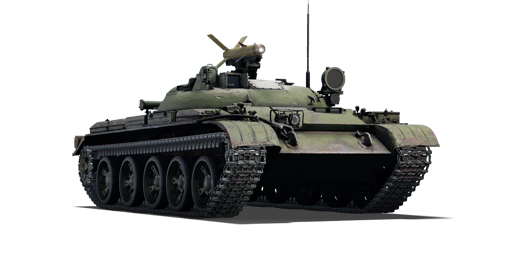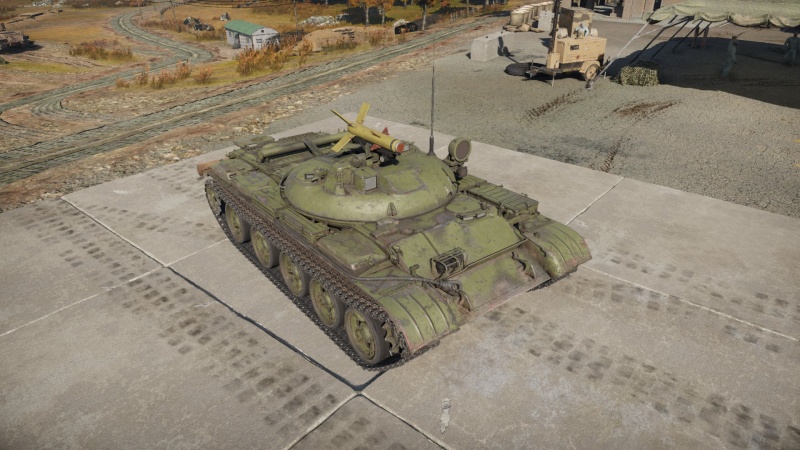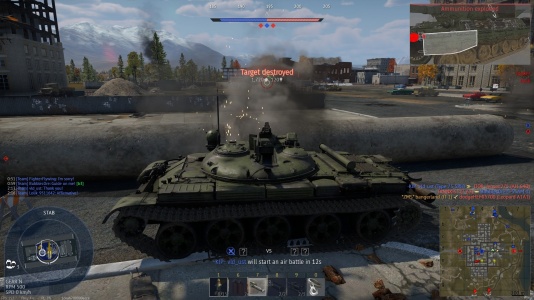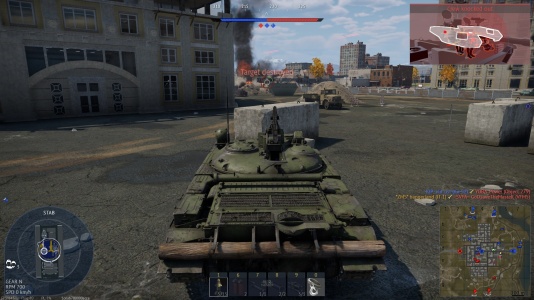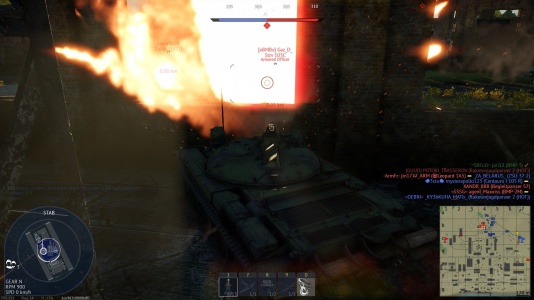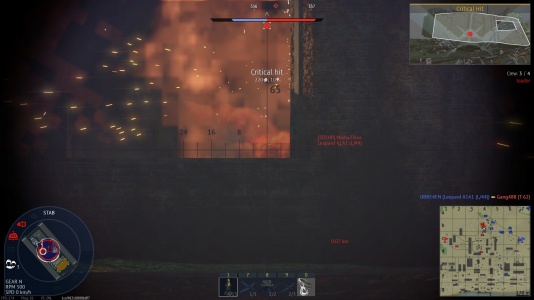IT-1
Contents
Description
The IT-1 was a Soviet anti-tank missile carrier designed with the intent of being fielded as a mobile and effective anti-tank weapon system. It was developed in the 1960s and was based on the chassis of the T-62. It was equipped with a 3M7 'Drakon' ATGM specifically designed for the vehicle. The missile had a range of up to 3 kilometers and could penetrate armor up to 500mm thick. The radio-based SACLOS guidance system used by the IT-1 allowed the operator to guide the missile using any one of the seven given frequencies and two codes. While the idea sounded promising, the IT-1 was criticized for a number of reasons, including the weight of the guidance equipment, the complexity of the guidance system, and the significant deadzone around the tank caused by the missiles' minimum range. Unfortunately, these flaws contributed to its widespread unpopularity, which ultimately caused the IT-1 to be phased out after only five years.
The IT-1 was introduced in Update 1.59 "Flaming Arrows" and was one of the first ATGM-equipped vehicles to be in the game. The IT-1 is a niche modification of the T-62 chassis with a new, low profile turret designed to carry a 3M7 Drakon ATGM launcher, which is the vehicle's only weapon system and mounted above its turret. The IT-1 isn't very survivable, so it's best used at long ranges and ideally behind cover to lessen its vulnerability. However, keep in mind that the ATGMs take some time to reach their target, and people who are aware of your presence can easily shoot them down.
General info
Survivability and armour
The hull front is an angled armour similar to T-62, it will protect from "normal" rounds at medium range, but regular APDS will only be likely to be deflected at about 1.2 km, sniper APDS might still penetrate. HEAT will penetrate it regardless of impact point.
The fuel tank on the front is a sort of a shield, but since it is the only fuel tank, if it gets annihilated by APFSDS or sufficiently strong HEAT-based bomb, the tank simply explodes, so hull shots should only be taken if necessary. There are also ammo racks everywhere in the IT-1 hull, so the faster it spends its ammunition, the less vulnerable it will be.
Hull sides are weaker and flat, but the general rules are similar if user does not get hit directly. Upper sides also can sustain attacks from autocannons below 35 mm calibre, and even those would need to use APDS. Bottom of the sides are the same weak spot with 30 mm RHA as other Soviet tanks, so knowledgeable light tanks or SPAA can destroy an IT-1 if they try really hard.
Turret is a shortened round dome, housing the optics and the missile rail at the very top. The dome itself is about 200 mm thick at the front and about 120 mm all around, but the optics can be penetrated to push explosives into the tank, and the very roof around the rail is only 30 mm thick, same with the hull roof. While it is difficult to penetrate for medium tanks with HE, HESH might be able to breach the roof and deal damage if it hits the vulnerable part or anywhere near the roof.
In the case of turret penetration, one of crew members usually dies outright, with a high chance of ammo rack being hit if the IT-1 didn't fire even a single shot before. If turret wasn't really penetrated, a turret ring has a tendency to jam, but fortunately its field repair time is about 3 seconds. Worst case scenario, the turret is penetrated by APFSDS or ATGM, in such case the splash damage is usually too high and the IT-1 is destroyed or damaged beyond ability to save itself.
Tank should avoid standing under artillery fire, as it is way too common for it to cause overpressure damage and just obliterate the IT-1. As for airstrikes, it is possible to survive a bombing run, but hits should be taken with a front and as far away as possible. Rockets aimed at the roof might destroy the IT-1, but they are reasonably difficult to land directly on top of the weak parts, unless fired from the very top.
The profile of a tank is short enough to use building debris as a cover or to hide behind dead tanks completely, but if dead tanks turret was blown off, the dome might be exposed.
The missile itself is put high enough to poke out of medium hulldown spots without revealing anything else. Normally that would mean that in such positions an IT-1 is essentially immortal and would only lose the missile upon being hit, but this missile is so gigantic, that if it is being hit by a chemical shell of any kind and size, the explosion will cascade and cumulative damage will overpressure the IT-1. Even HEAT will suffice to do it. Firing at the missile with ammunition that does not deal overpressure damage will merely detonate it and force the tank to reload again, but can prove fatal if enemy is too close.
Examples of hulldown in random spots of urban enviroment with or without exposing the turret:
Armour type:
- Rolled homogeneous armour (Hull)
- Cast homogeneous armour (Turret)
| Armour | Front (Slope angle) | Sides | Rear (Slope angle) | Roof |
|---|---|---|---|---|
| Hull | 100 mm (60°) Front glacis 100 mm (55°) Lower glacis |
80 mm | 45 mm (1-2°) Upper 45 mm Lower |
30 mm |
| Turret | 200 mm (19-60°) | 120 mm (23-61°) | 65 mm (21-56°) | 30 mm |
| Cupola | 40 mm (spherical) | 40 mm | ||
Notes:
- Suspension wheels are 20 mm thick, tracks are 18 mm thick
Mobility
In arcade mode, the IT-1 will generally move at 34 km/h and accelerate towards 54 km/h after a while. When climbing, it will lose most of its speed and go at about 10 km/h and it does not like rushing steep hills, very likely sliding off them at the last moment even with a head start. The reverse is very slow with stable -8 km/h.
All in all it's like a Soviet medium tank, but on a bit slower side.
The IT-1 does not have neutral steering, but it usually turns fast enough to compensate the broken turret ring, so waiting for its field repair and turning to reply is reasonable. It's better to turn with a front gear if possible (might not be an option when one track was destroyed)
| Game Mode | Max Speed (km/h) | Weight (tons) | Engine power (horsepower) | Power-to-weight ratio (hp/ton) | |||
|---|---|---|---|---|---|---|---|
| Forward | Reverse | Stock | Upgraded | Stock | Upgraded | ||
| Arcade | Expression error: Unexpected * operator. | 899 | Expression error: Unexpected round operator. | __.__ | |||
| Realistic | 513 | Expression error: Unexpected round operator. | __.__ | ||||
Modifications and economy
Armaments
Main armament
The missile is a 3M7, unique to the IT-1, it does not turn very well in any plane and has penetration statistics of older first generation missiles. The missile can be launched on a move without restrictions, so the carrier can fight while moving towards its target or cover and work around its own vulnerability. Overpressure effect from HEAT ATGM will also obliterate tanks with less than 15 mm of RHA armour if the blast wave hits their weak spots, but usually the missile must hit them directly.
Since in AB and RB the gun sight is placed on actual missile itself, not on optics, the tank is quite invincible once it gets to ideal cover or behind an enemy dead carcass (assuming the user does not make a lot of mistakes afterwards). Do remember, though, that it is offset to the right and tank might have to turn the hull in a way that gets it exposed at some spots, at least briefly. Since the missile can be destroyed by return fire and can potentially be detonated to instantly destroy the tank, it must be fired as soon as possible.
Firing a vertical shot is technically possible, but not recommended at all, since missiles turning ability is low, and each degree it is overcompensating adds another 70 m of minimal range. So if you want to "mortar" the enemy tank, it must be standing at least 800m away. Such shot is also often clearly impossible in RB due to guidance restrictions - if you can't aim straight at an enemy after this, the missile will not fall down in RB. Even in AB, such shot should ONLY be done in a sniper scope, without leaving it until the missile hit the target, as it increases guidance precision.
Firing over hills and cover is somewhat difficult, as the missile is big and often accidentally scratches tanks own cover and explodes. Try to be extra careful about it. For the same reason it is rather easy to shoot down with MG, as it only needs 3 hits from any MG to detonate.
Examples of aiming poorly and okay:
If missile rail or missile was damaged (it will appear as blown off the turret despite being "loaded"), it must be repaired. It might also start jamming and field repair usually does not solve this: Even "repaired" launcher might start "clicking" instead of firing and then manual repair must be started (which takes a very long time). When it can actually be fired is hard to tell, but it's usually at 1/2 of manual repair duration. The missile must be intact for this to happen either way (to be present on top of the turret), as it might get shot off the turret again during repairs.
Repairs, damage and firefighting do not reset reload timers, so as long as the missile is intact, tank will be able to fire right away.
| 3M7 missile | Turret rotation speed (°/s) | Reloading rate (seconds) | ||||||||
|---|---|---|---|---|---|---|---|---|---|---|
| Mode | Capacity | Vertical | Horizontal | Stabilizer | Stock | Upgraded | Full | Expert | Aced | Autoloader |
| Arcade | 15 | -9°/+17° | ±180° | Two-plane | 22.0 | 30.5 | 37.0 | 40.9 | 43.5 | 10.00 |
| Realistic | 14.9 | 17.5 | 21.3 | 23.5 | 25.0 | |||||
Ammunition
| Penetration statistics | |||||||
|---|---|---|---|---|---|---|---|
| Ammunition | Type of warhead |
Penetration @ 0° Angle of Attack (mm) | |||||
| 10 m | 100 m | 500 m | 1,000 m | 1,500 m | 2,000 m | ||
| 3M7 | ATGM | 500 | 500 | 500 | 500 | 500 | 500 |
| Missile details | ||||||||||||
|---|---|---|---|---|---|---|---|---|---|---|---|---|
| Ammunition | Type of warhead |
Velocity (m/s) |
Range (m) |
Projectile mass (kg) |
Fuse delay (m) |
Fuse sensitivity (mm) |
Explosive mass (TNT equivalent) (kg) |
Ricochet | ||||
| 0% | 50% | 100% | ||||||||||
| 3M7 | ATGM | 224 | 3,000 | 54 | 0.05 | 0.1 | 3.15 | 80° | 82° | 90° | ||
Ammo racks
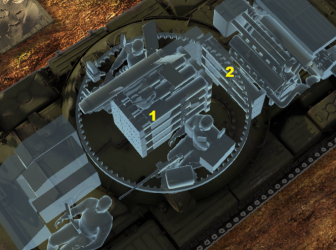
| Full ammo |
1st rack empty |
2nd rack empty |
Visual discrepancy |
|---|---|---|---|
| 15 | 4 (+11) | 1 (+14) | No |
Notes:
- Missiles are modeled individually and disappear once shot.
- It is not possible to select how many missiles to bring into battle.
Machine guns
MG is usually used to check for/to remove mild obstacles like bushes or thin fences before firing ATGM as to avoid wasting a critical shot. It also can be used in AB against a hostile IT-1 to damage their missile rail.
| 7.62 mm SGMT | ||||
|---|---|---|---|---|
| Mount | Capacity (Belt) | Fire rate | Vertical | Horizontal |
| Coaxial | 2,000 (250) | 600 | -6°/+17° | N/A |
Usage in battles
- Gameplay summary
Like most ATGM tank destroyers, being only equipped with the 3M7 anti-tank missile can put the IT-1 at a disadvantage in many situations when facing conventional enemies armed with a cannon, but it does have the capacity to excel in certain situations. The 3M7 missile itself is one of the largest at this tier, with 3.8 kg of TNT equivalent explosive mass, compared to 2.4 kg of the TOW missile and 3 kg of the HOT missile. Coupled with its decent penetration, it can take out virtually anything it will face with a single hit. In addition, the launcher can depress up to 9 degrees, making it easy for the IT-1 to take advantage of cover to become virtually untouchable for tanks that rely solely on APDS, and the turret can rotate a full 360 degrees, which is pretty unique among ATGM vehicles. Finally, the IT-1 is relatively well armored compared to most other vehicles that carry ATGMs, and while it is insufficient to rely on especially against higher tier opponents, it still offers decent protection.
- Close range engagements
The IT-1 is completely outclassed in close-range engagements when it is in the open, as any cannon-armed vehicle will win a snapshot competition, and an argument can be made that any sane tanker would immediately load HE/HEAT/HESH and fire at the turret as a second responce if they survive the initial clash. However, if the IT-1 can remain behind cover, such as behind ground rubble or on top of a hill, it can often outclass conventional tanks attempting to push it as it will often be able to fire first owing to its raised launcher.
If direct combat is unavoidable, try to separate opponents and fight them one on one, at least at first. If nothing can be done, charge at the nearest opponent, destroy them, crash into their burning carcass and use it as a mobile bunker by moving it or by moving around it. Aiming with fires in the camera's face is difficult, but it is still better than being destroyed. Abuse the IT-1's ability to fire on move to pounce onto opponents out of cover and destroy or spook other enemies, then hide again. Always hide the missile behind the newfound "cover" as some opponents might just try to disarm you out of desperation and might disarm or straight up obliterate you.
Needless to say, some attention must be paid to your team status as well, as sometimes an enemy might get very bold if all allies surrounding you have died, and since you only have one launcher, fear is all you have to protect the IT-1 from a large tank squad. In fact, a giant wave of tanks firing machine guns at your launcher is something you cannot deal with at all, but they don't necessarily know or feel that way.
- Long range engagements
The IT-1 performs best at medium to long ranges while behind cover. The ATGM will easily dispatch of most enemy vehicles, and the IT-1 is very difficult to hit when it uses cover effectively. However, keep in mind that the 3M7 ATGM is not particularly fast and is much less manoeuvrable than other ATGMs, so enemies may have time to retreat to cover or simply outrun the missile's tracking ability before it reaches them.
There is also a non-zero probability of being hit by HEAT of any other sniper tank, being randomly HE'd by an artillery tank, or even being countered by a hostile ATGM, if standing on the same spot for a long time. Remain at least semi-vigilant, otherwise some unknown threat might hit your missile right as it pops out of the turret and set the tank crew on fire.
Hills or mountains with a view onto a road that an enemy must use to advance are perfect for the IT-1, but sometimes a good sniping spot is vulnerable to a flank attack. If an enemy is pushing towards your cover and a retreat is needed, the ESS can come in handy (do note, that it does not block thermal sights and will not help against BR 9 tanks).
Do note, that all maps have different settings for building destructibility, and, unfortunately, on some maps you have to deal with tanks camping behind an indestructible wall. The same goes for the enemy though, so you can hide behind such cover for as long as you'd like.
Notable enemies
- Tanks with ability of indirect attack: These are the tanks that can take out a hulldown IT-1 with relative ease and not even put themselves into any danger. Generally, tanks of the same tier or below have to get close to attack the IT-1 (vertical ATGM tanks, such a stock BMP-1, Striker, Type 60 ATM) and often can be merely zoned out, while some tanks of the current or higher tier can outright blow the IT-1 up from wherever they'd like to (proximity ATGM carriers like CM25, Dardo, M3A3 Bradley). Either way, all of them can attack the IT-1 from complete safety and are very difficult to counter once they got into the firing range. Destroy them immediately and do not drive into their kill-zone.
- HE tanks: Another type of difficult opponents is HE tanks. They are very fragile, but can destroy the IT-1 by hitting the missile or the turret with HE and thus causing overpressure damage. HE tank players are a significantly worse opponent for you than any regular sniper tank armed with HEAT, as while they may not be as obsessed with hunting you down, they are extremely patient and also constantly employ indirect firing techniques, sometimes rendering your cover obsolete. For example BMP-3 can relentlessly bombard IT-1 with HE every 4 seconds at angles which are impossible to block. If artillery tank finds out where you are and know what it's doing, you really need to leave.
- Other IT-1s: It's not rare to fight your own copy in AB. Since the IT-1 is one of the hardest tanks to bait out of cover, some extreme measures must be taken. First of all, if another IT-1 is busy looking at something else, you can try to sneak a shot into their turret, they might just explode. If that's impossible, fire at their missile as it's almost reloaded. The main point here is to not let them hit your missile before it got fired off, or you lose. If you both whiffed the shot, use machine gun to damage their reloading mechanism, then pounce them.
- Heavily-armed wheeled tanks: These are incredibly dangerous, as they can also be ATGM tanks with superior ammo or multiple launchers, but they are almost always vulnerable to ATGM overpressure wave and easy to destroy by hitting them anywhere. Paying attention to the general rush directions and roads can save you from a lot of headache when dealing with them. Make sure to dodge tandem ATGMs, as those can actually destroy you even if you go in full "siege mode" by hitting the missile on top of the turret.
Pros and cons
Pros:
- Anti-tank missile 3M7 is slightly faster than ones found on early light tanks
- Can fire on the move without restrictions
- Good armour of a T-62, will often survive attempts to simply use HE or even HESH on it, can brawl with a light tank or SPAA, unless they have APDS belts or know all of the weak spots
- The turret has even lower profile than usual and is hard to punish for overextension and use of low cover due to its shape and armour value, unlike Swingfire, BMP-1, M60A2 and other alternatives
- Gun depression allows for shooting from ridges
- In AB and RB, the gun scope is based on a missile itself, and in some hulldown spots just the missile is exposed, making it difficult to find and invulnerable to kinetic shells
- Layout of the hull makes kinetic hits from the front easier to survive
- Relatively fast reload on any crew
Cons:
- No backup weapons, only one type of missiles, low penetration power like early ATGMs, missiles reload slower than conventional tanks and tank can only use one per reload, which makes it overall less forgiving than other ATGM tanks in direct fight
- HEAT is still a rather popular shell type and if it hits the missile before the IT-1 fires it off, the tank is gone
- Movement speed of this tank is less than average - it can't chase or run from many rank VI tanks and may be forced to fight light tanks for its sniping spots
- Missile has very low manoeuvrability in flight, making it extremely difficult to hit moving targets, especially at longer ranges.
- Missile is very big and has tendency to hit your own cover when in deep hulldown, or to get shot down by enemy MG
- Like many Soviet tanks of the rank, the IT-1 has only one fuel tank in the front, and any strong enough chemical shell or APFSDS will detonate it on direct hit, resulting in instant tank destruction
History
Development
The genesis of the concept of "missile tanks" came from the Premier of the Soviet Union at the time, Nikita Khrushchev. Khrushchev believed that missiles were the key to armour dominance, spelling the end of naval battleships and tanks. This belief led to his order that the heavy tank programs like the T-10 be cancelled in the 1950s. Khrushchev ordered that a missile-capable tank be fielded in replacement, with development starting in 1956 despite the immature technology. Though the military finds little favour with the concept, they begrudgingly carry it out by orders of the Kremlin and many facilities in the Soviet Union started on the concept.[1]
The Uralvagonzavod facility designed a missile tank labelled Object 150. The chassis was derived form the T-54/55 tanks, though the hull was lengthened for more stowage space for the missiles. The tank used the 2K4 Drakon missile system, a sophisticated machine that used a SACLOS guidance system and had a warhead able to penetrate 500 mm of armour. The missile, later designated the 3M7 Drakon, was still rife with problems and required further development. The design could carry 15 missiles, with 12 inside the vehicle's autoloader and 3 spare held in storage. The military dislike this storage as it was much lower than the 30+ rounds in their conventional tanks, but it was expected that the hit probability on the missiles would be higher to compensate. Firing tests started at the Kubinka Proving Grounds mid-1963 and was approved by Khrushchev in 1964. Then in October 1964, Khrushchev was overthrown. Without the constant urging by Khrushchev, the military delayed the Object 150 design's serial production to 1968 to prioritize on main battle tanks and to let the missile technology to develop to a more battle-worthy level. The benefit of the development of the Object 150 during this time period was that it provided a lengthened hull that would be used in the new Soviet tank design Object 165, which would be adopted as the T-62.[1]
Adoption & retirement
Object 150 finally entered production in 1968 with 220 units made between 1968 to 1970. Its purpose was to provide additional firepower to T-62 tanks. It was designated the IT-1 tank destroyer and issued to battalions at Belarus and Carpathian Military Districts, crewed by tank crews and artillery crews respectively.[1] A variant of the IT-1 was made with a turbine engine, designated the IT-1T. In the time period it spent in active-duty, it proved an unpopular vehicle. The low missile count did not sit well with the tank crews and the missiles had a dead zone of around 300-500 meters before the missiles could be guided. The IT-1 was also complicated to use and maintain compared to existing artillery vehicles, a fact that did not sit well with the artillery crews. Though the missile launcher was praised for its long-range accuracy, the IT-1 did not sit well with the overall military situation and was discontinued sometime after its deployment in 1972. The remaining missile tanks in inventory were converted to recovery vehicles.[1]
Though the missile tanks concept failed, many more attempts were made to incorporate a missile system as a secondary armament onto Soviet tanks, succeeding with the usage of missiles in the 125 mm smoothbore guns on Soviet tanks past the T-64.
Media
- Skins
- Videos
See also
- Vehicles equipped with the same chassis
- Other vehicles of similar configuration and role
External links
References
| USSR tank destroyers | |
|---|---|
| SU-76M | SU-76M · SU-76M (5th Gv.Kav.Corps) · SU-85A |
| SU-57B | SU-57B · SU-76D |
| T-34 Derivatives | SU-122 · SU-85 · SU-85M · SU-100 · SU-122P |
| Heavy Tank Derivatives | SU-100Y · ISU-122 · ISU-122S · SU-152 · ISU-152 · Object 268 |
| SU-100P and Derivatives | SU-100P · Object 120 |
| Wheeled | YaG-10 (29-K) |
| Airborne | ASU-57 · ASU-85 |
| Rocket | BM-8-24 · BM-13N · BM-31-12 |
| ATGM | IT-1 · Shturm-S · Object 775 · Khrizantema-S |
| Artillery | 2S1 · 2S3M |
| Other | SU-5-1 · ZiS-30 · SU-122-54 |
| USA | SU-57 |


